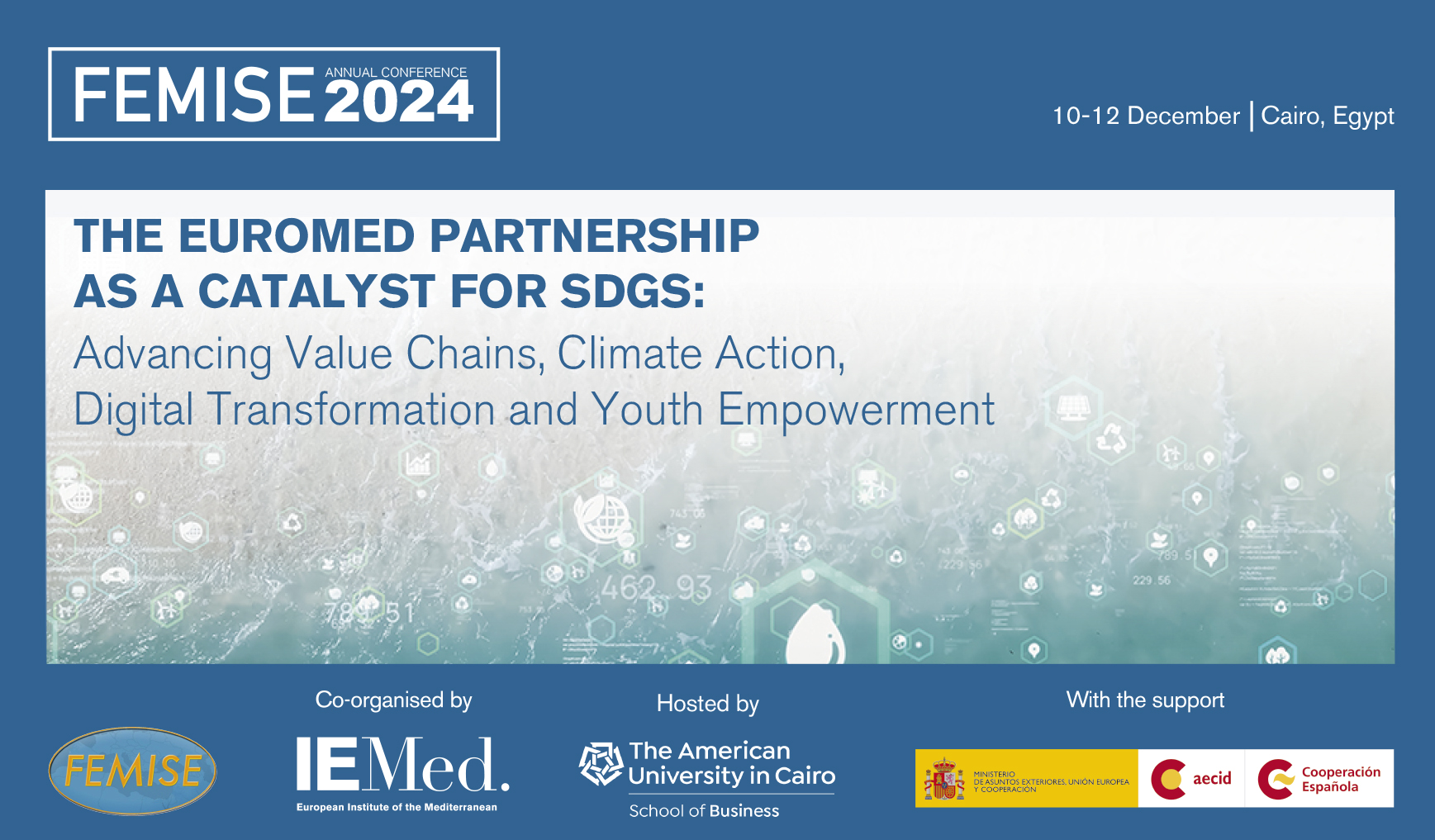
| Register here | Download Agenda | Download Concept Note |
The EU-Med region holds great potential for sustainable development due to its abundant natural resources, prominent role in global trade, and vibrant young population. However, the region faces significant challenges, reflected in its slow progress toward achieving the Sustainable Development Goals (SDGs).
The South and Eastern Mediterranean Countries (SEMCs) are no exception. Despite steady improvements over the past two decades, their average SDGs score in 2024 stands at 65% with significant variations among countries, ranging from 72.5% (Tunisia- ranking 60th) to 63.9% (Lebanon ranking 110th)[1], indicating a lot of room for improvement[2]. Progress across the 17 Goals is uneven, with each SEMC having between 1 and 3 Goals “On track” (except for Egypt with none), between 6 and 9 Goals “stagnating,” and between 5 and 7 Goals “moderately increasing” (except for Lebanon with only one). All SEMCs have “decreasing Goals expect for Tunisia and Egypt, which have none.
Overall, decent work, economic growth and innovation (SDG 8 and 9), gender equality and social inclusion (SDG 1, 5 and 10), climate action (SDG 13,14 and 15) are among the most challenging goals for the SEMCs.
While localisation of the SDGs will bring implementation closer to communities and territories[3], regional cooperation is essential to overcome stagnation through collaboration and partnerships in various aspects. By leveraging the Euromed partnership, countries in the region can create synergies that not only accelerate progress towards the SDGs but also enhance regional stability and prosperity.
In this context, the EuroMed partnership has the potential to rejuvenate SDGs progress[4] by:
- Integrating sustainable value chains to foster trade and investment while enhancing innovation and digital transformation;
- Addressing common environmental challenges through climate action and sustainable practices, including agriculture, renewable energy, water and food security, etc.
- Supporting social and territorial development by investing in education, training (TVET), skills, healthcare, social protection and inclusion, addressing migration and refugees’ issues, creating jobs, and promoting entrepreneurships to reduce inequality;
- Empowering Mediterranean youth by creating decent jobs, promoting skills, innovation, and social integration.
CONFERENCEOBJECTIVES
Against this backdrop, the 2024 FEMISE annual conference will bring together policymakers, researchers, private sector representative, international organisations, development agencies, climate change experts, civil society, young entrepreneurs, with the following objectives:
- Engage stakeholders in a dialogue on how the Euromed partnership can drive sustainable development and advance SDG progress;
- Promote strategies for enhancing sustainable collaboration while prioritizing resilient value chains, climate action, digital transformation, innovation, investing in people and territories, and youth empowerment.
- Formulate actionable recommendations for achieving a sustainable and resilient EU-Med partnership with youth at its center.
The 2024 FEMISE annual conference is hosted by the School of Business at the American University in Cairo (AUC) and co-organized by the European Institute of the Mediterranean (IEMed), with the support of the Spanish Agency for International Development Cooperation (AECID).
CONFERENCESTRUCTURE
The conference will include four plenary sessions where thought leaders will address the following sub-themes, in addition to the opening and closing sessions. It will also feature four thematic sessions where selected researchers will present their research outputs on these sub-themes.
The conference plenary sessions will be addressing the following issues:
WELLCOME REMARK (10 December 2024)
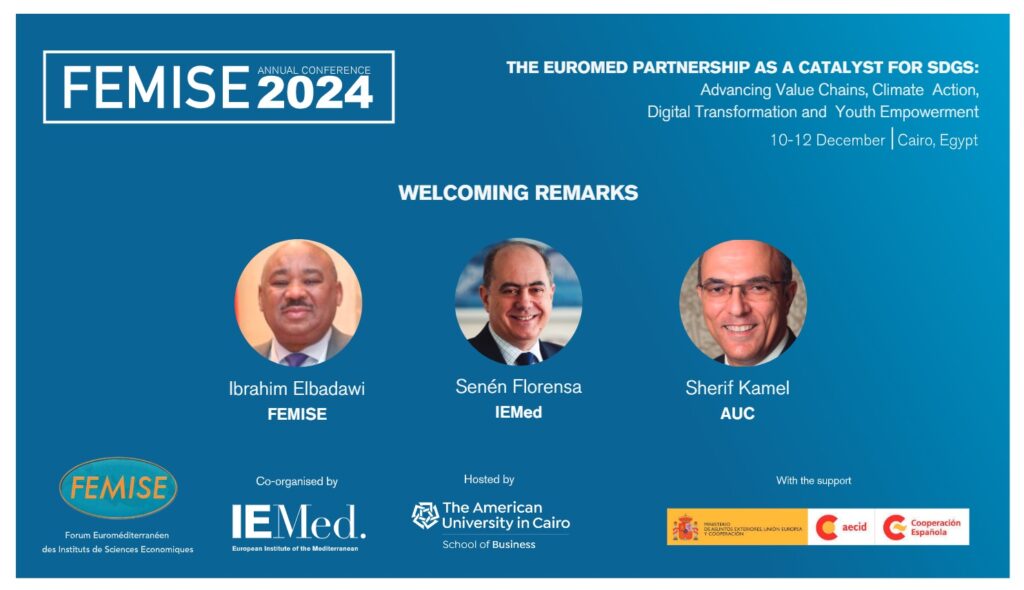
OPENING SESSION (10 December 2024)
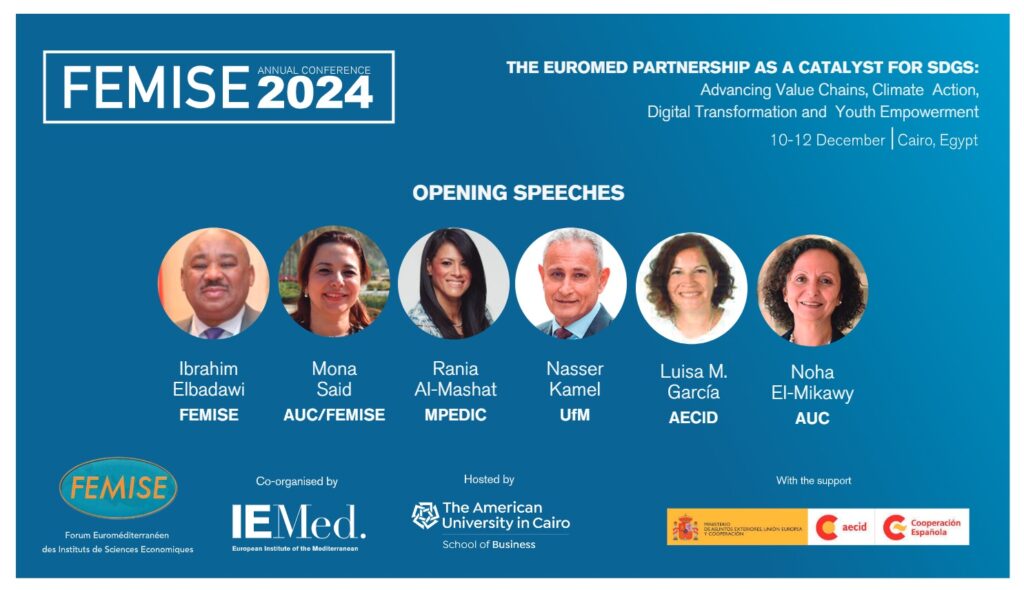
The EU-Med region faces common challenges such as climate change, economic and social inequalities, unemployment, social exclusion, and migration. Addressing these complex issues requires collaboration on shared priorities to find common solutions while advancing progress toward the SDGs. Speakers will address issues such as how can the EU-Med region leverage its partnership to accelerate SDG progress? What technical and financial support is needed for the SEMCs? Is a more equitable role in global economic governance relevant? How can the Mediterranean Strategy for Sustainable Development (MSSD) be fully leveraged to help progress toward the SDGs at regional, sub-regional, national and local levels in the Mediterranean region.
PLENARY SESSION 1: Accelerating Sustainable Value Chain in the EU-Med region through Digital Transformation (11 December 2024)
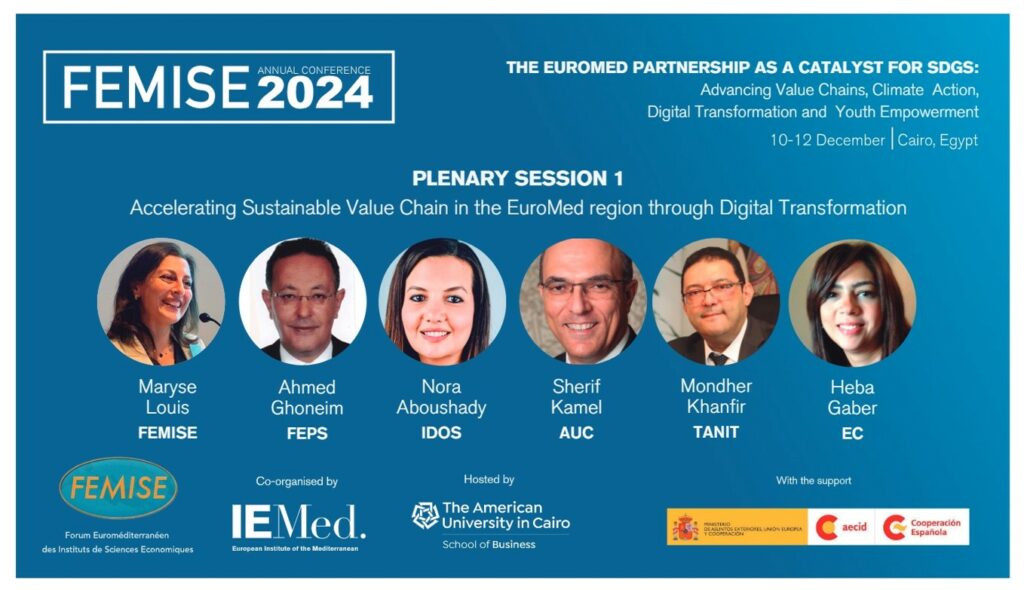
Enhancing EU-Med value chains can foster economic integration, build resilience, and promote fair trade practices, contributing to job creation, environmental actions (Green Deal), and regional progress, but challenges still exist[5]. Digital transformation can advance sustainable development[6] and facilitate regional value chain integration by enhancing innovation, product quality, competitiveness, new technologies, and access to data and information. This will have a positive spill-over effect on the economic, social and environmental aspects across the region. Speakers will address issues such as how can the EU and Med countries collaborate to create sustainable value chains? What role can the digital transformation play in this? What role for private sector and entrepreneurs? How to finance the upgrade of infrastructure and services? is the digital divide affecting the EU-Med integration, sustainable development and SDGs?
PLENARY SESSION 2: Accelerating Climate Action and Environmental Sustainability in the EU-Med region (11 December 2024)
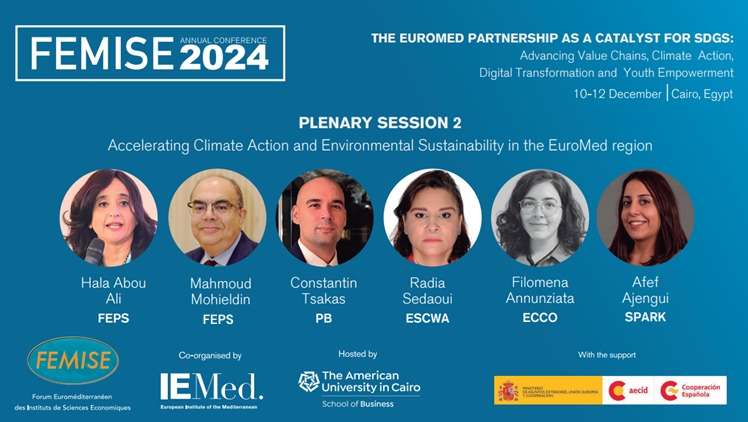
As the region faces numerous challenges[7], there is a need to expediate the EU-Med green transition, enhance innovation in renewable energy, water and agriculture to promote sustainable growth, job creation and attainment of SDGs. Despite progress, the pace of action needs to accelerate to meet SDG targets, particularly in renewable energy adoption and sustainable water management. Shifting towards sustainable practices in sectors like agriculture, energy, and manufacturing is crucial for environmental protection and economic resilience in the EU-Med region. This requires regional collaboration on climate change mitigation and adaptation strategies, promoting renewable energy sources, advancing relevant technologies, and implementing sustainable resource management practices. Issues addressed will include: How can EU Med help achieving climate goals and environmental sustainability? What strategies can accelerate the green transition in the MED region ? How can innovation accelerate green transition? Create green jobs?
PLENARY SESSION 3: Fostering Social and Territorial Equalities and Sustainable Development in and across the EU-Med Region (12 December 2024)
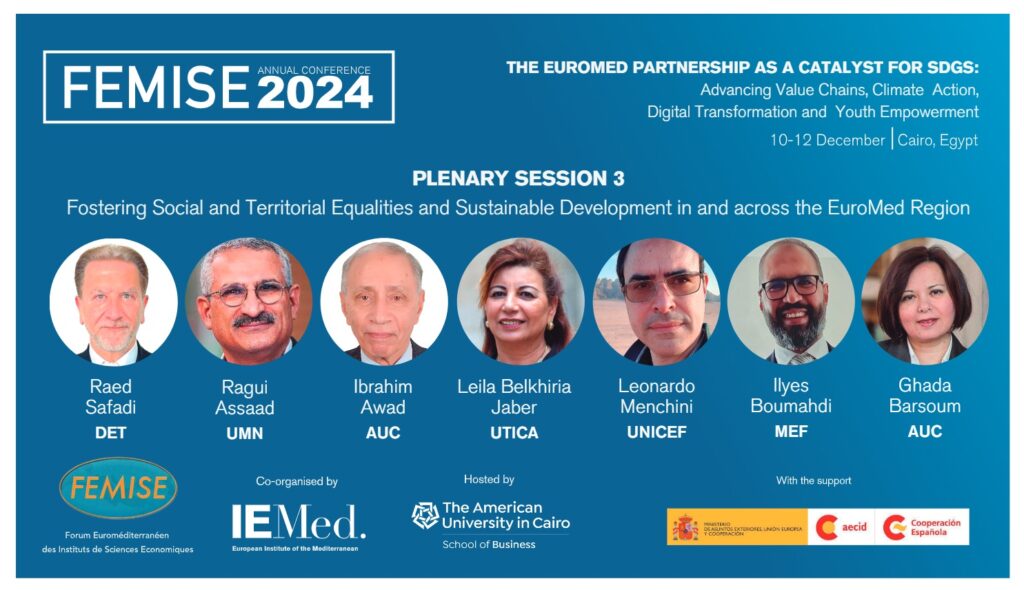
Social and territorial disparities are major challenges in SMECs, reflected in pronounced inequalities in terms of opportunities and access to resources based on gender, territory and socioeconomic status. Supporting social and territorial development is key to advance sustainable development and strengthen the Euromed partnership. Investing in education, training, healthcare and social protection can expand employment opportunities, reduce unemployment, enhance female labour participation, and decrease inequalities. Addressing migration and refugees’ challenges is also becoming a priority. Key issues that will be addressed include: What is blocking the translation of social gains into economic progress in the region? What are the main obstacles to gender equality? Is social protection adequate in the region? What policies are needed to ensure social cohesion? What is the status of territorial disparities in SEMCs? How to further promote social entrepreneurship to create more job opportunities and drive innovation in the region?
PLENARY SESSION 4: Empowering Mediterranean Youth: The Catalyst for an Integrated EU-Med Region Achieving SDGs (12 December, 2024)
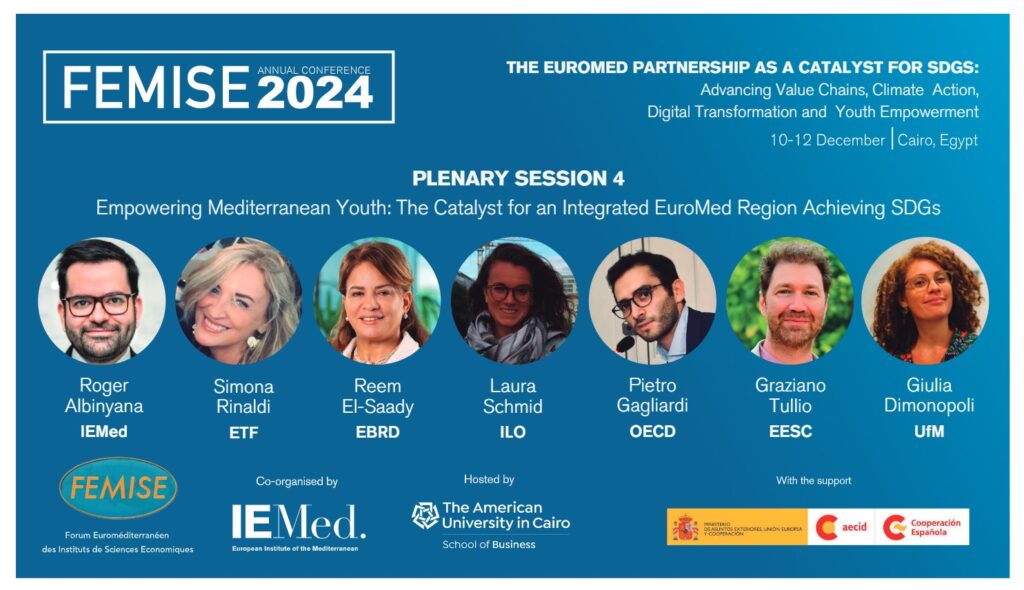
Despite being a large proportion of the population, Mediterranean youth face many challenges, such as exclusion, unemployment and lack of opportunities, just to name a few[8].. By fostering youth entrepreneurship and equipping them with skills, knowledge, and resources, they can become active participants and leaders in achieving the SDGs. Issues that will be addressed include: How can regional cooperation better contribute to youth empowerment in the Mediterranean? What obstacles hinder the skills-to-jobs matching for youth? How to effectively reduce youth unemployment? How to enhance the region’s innovation strategy and digital transformation to make it relevant and practical for youth? How to enhance youth creativity and bridge the gap between research and markets? Are young Mediterraneans fairly represented in decision-making processes at local, national, regional, and global levels?
In addition to the 4 plenary sessions, the FEMISE annual conference will give the floor to EU-Med researchers to present the results of their research addressing the theme of the conference in 4 thematic sessions. The 16 papers that will be presented were selected from among 68 submitted papers following a call for papers. The selected papers are believed to bring a value added, new ideas and approaches and relevant recommendations with regards to EU-Med integration.
The thematic sessions will be entitled as follows:
Thematic Session 1: Driving Sustainable Development in the EuroMed: The Role of Value Chains and Digital Transformation
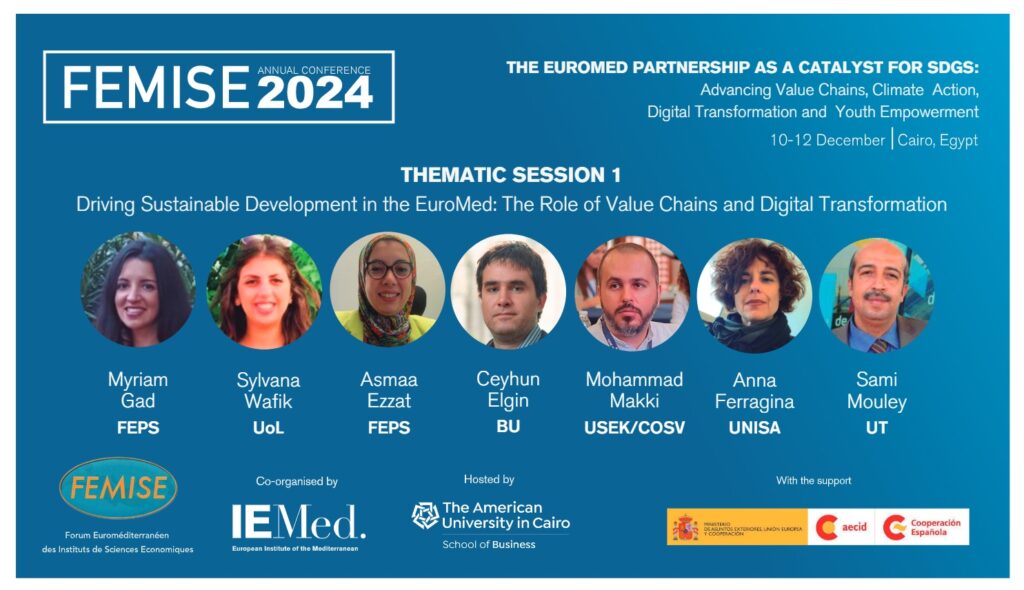
Thematic Session 2: Navigating the Energy Transition: Economic, Social and Environmental Impacts in the EuroMed
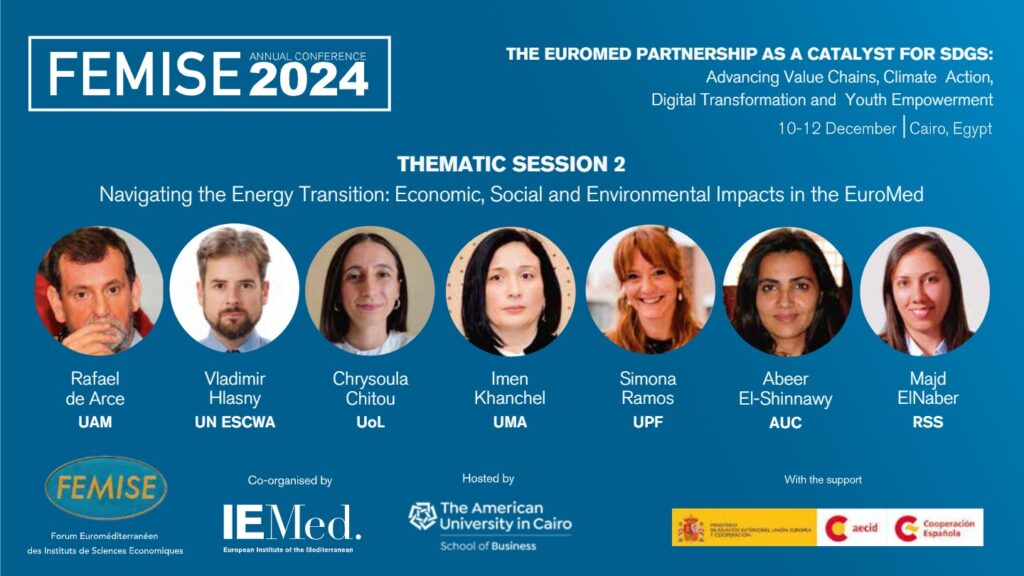
Thematic Session 3: Empowering communities, Promoting Entrepreneurship, and Addressing Social and Territorial Inequalities
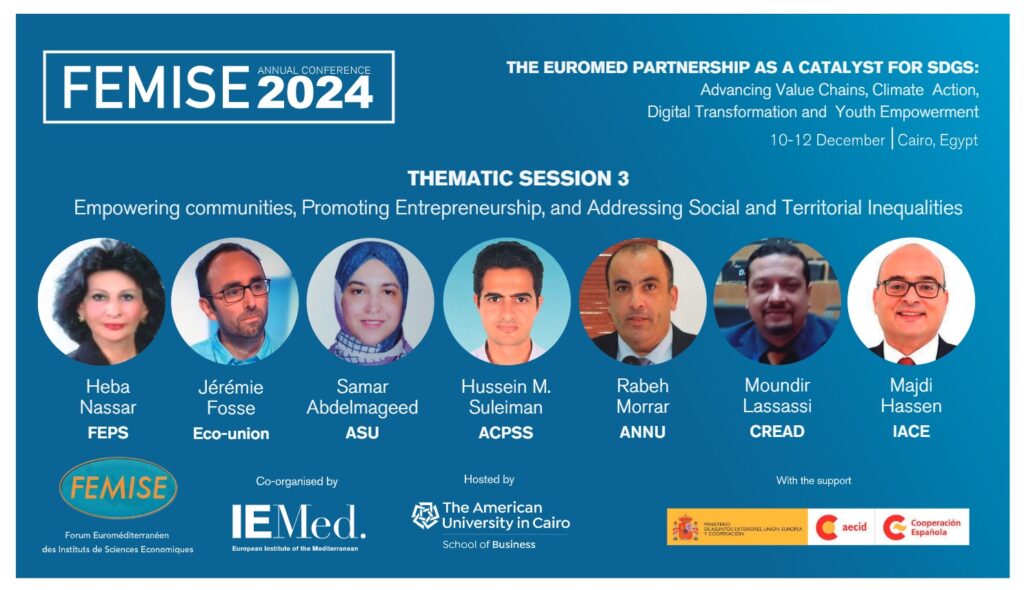
Thematic Session 4: Harnessing the Power of Youth: Fostering Innovation, Entrepreneurship, and Social Change in the EuroMed
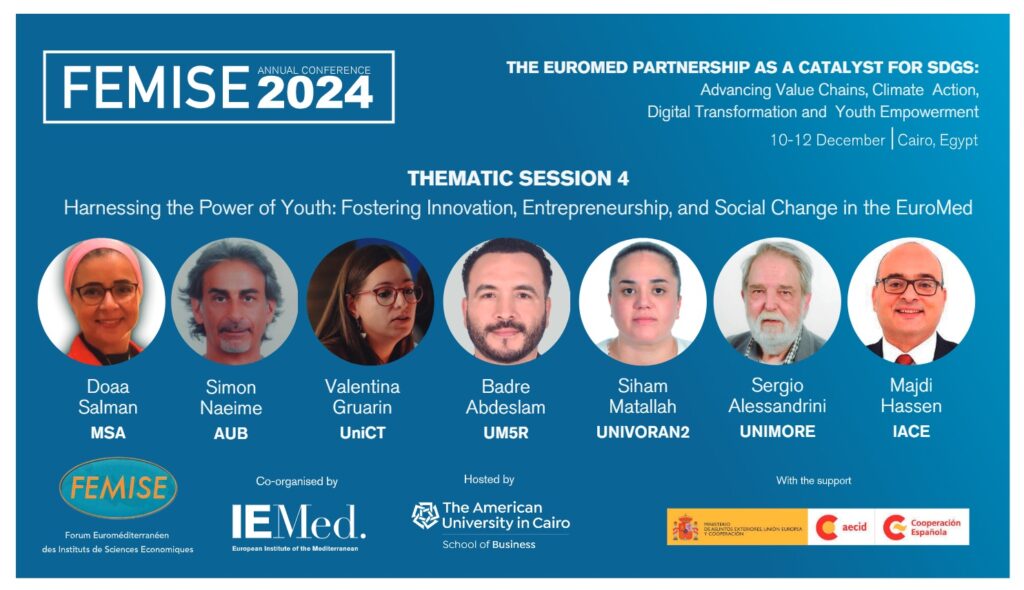
| Register here | Download Agenda | Download Concept Note |
Partners for the FEMISE annual conference:

[1] Sustainable Development report, 2024. https://unstats.un.org/sdgs/report/2024/The-Sustainable-Development-Goals-Report- 2024.pdf and https://dashboards.sdgindex.org/rankings
[2] On the EU side, the lowest performer scores 78.71% (Greece ranking 29th) and the highest is 83.45% (Germany ranking 4th).
[3] Localizing [the SDGS] is not the parachuting of global goals into local contexts. It means implementing global agendas in cities and territories to achieve local and global goals. It is a process of harnessing local opportunities, priorities and ideas” (https://www.learning.uclg.org/ localizing-sdgs), UNDP, POLICY BRIEF: SDG LOCALIZATION IN THE ARAB STATES, 2022- https://www.undp.org/arab-states/publications/sdg-localization-arab-states
[4] https://www.coe.int/en/web/congress/-/xavier-cadoret-euro-mediterranean-integration-is-crucial-for-the-implementation-of-sdgs
[5] Please refer to the FEMISE annual conference 2023 plenary session 2 for more details: https://www.femise.org/en/articles-en/femise- annual-conference2023-plenary-session-2-report/
[6] SDG article on : “Harnessing Digital Transformation to rescue SDGs”, July 2023, https://sdg-action.org/harnessing-digital-to-rescue- the-sdgs/
[7] Please refer to the FEMISE annual conference 2023 plenary session 3 for more details: https://www.femise.org/en/articles-en/femise- annual-conference-2023-plenary-session-3-report/
[8] Please refer to the FEMISE annual conference 2023 plenary session 3 for more details: https://www.femise.org/en/conferences-and- seminars/femise-annual-conference2023-plenary-session-4-report/

